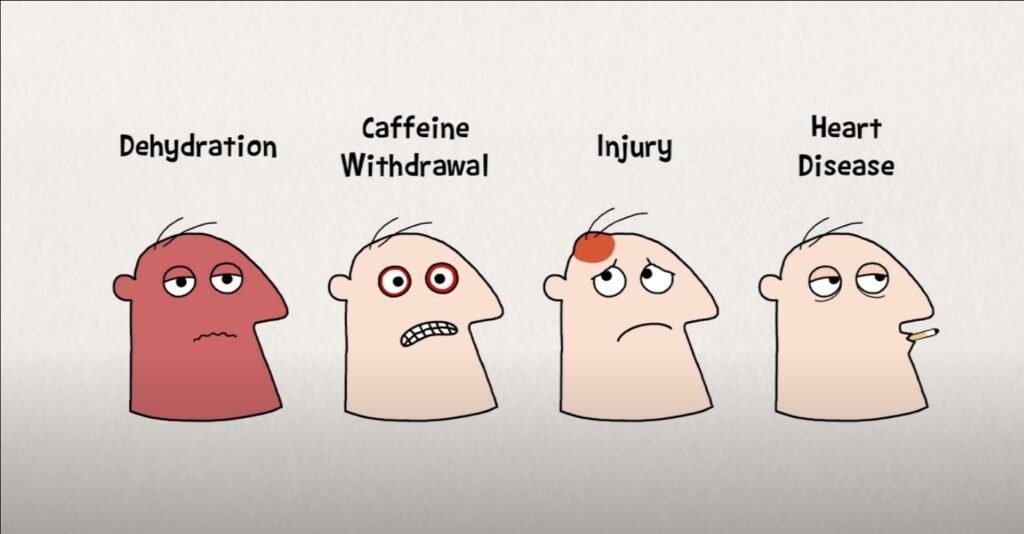Introduction to Headaches
Headaches are a common problem experienced by people everywhere. While most are functional, arising from temporary disturbances, some are organic, indicating underlying brain changes.
Functional vs. Organic Headaches
Functional Headaches: Temporary Upsets
Functional headaches are often caused by temporary disruptions in the body and typically don’t signify severe health issues.
Organic Headaches: Related to Brain Changes
Organic headaches, on the other hand, may indicate structural or chemical abnormalities in the brain, requiring medical attention.
Understanding Headache Pain
The sensation of pain in headaches originates from nerve irritation in muscles surrounding the head and neck, along with the constriction of blood vessels.

Various Types of Headaches
Tension Headaches
Tension headaches are the most common type and often result from stress and muscle tension.
Migraine Headaches
Migraines are characterized by severe, throbbing pain, often accompanied by other symptoms like nausea and sensitivity to light and sound.
Cluster Headaches
Cluster headaches occur in cyclical patterns or clusters, causing intense pain usually around one eye.
Testing and Diagnosis
Diagnostic procedures for headaches may include detailed medical history assessments, physical examinations, and, in some cases, neuroimaging studies. As Thomas Edison once said, “The doctor of the future will give no medicine but will instruct his patient in the care of the human frame, in diet, and in the cause and prevention of disease.” Proper diagnosis lays the foundation for targeted interventions and better symptom management.
COVID-19 Headaches and Treatment
With the emergence of the COVID-19 pandemic, headaches have been reported as a common symptom among infected individuals. Understanding the relationship between COVID-19 and headaches requires ongoing research efforts. As Marie Curie famously declared, “Nothing in life is to be feared; it is only to be understood. Now is the time to understand more so that we may fear less.” Continued exploration of this association is essential for effective management strategies.
Yoga for Migraine and Prevention
In addition to conventional treatments, alternative therapies like yoga have shown promise in alleviating migraine symptoms and reducing headache frequency. As B.K.S. Iyengar once said, “Yoga teaches us to cure what need not be endured and endure what cannot be cured.” Incorporating holistic approaches into headache management plans can offer individuals additional avenues for relief and prevention.
Common Causes of Headaches
Allergies
Certain foods like milk, chocolates, and alcohol can trigger headaches in susceptible individuals.
Emotional Reasons
Stress, hidden hostility, and intense emotions can lead to tension headaches.
Eyestrain
Prolonged use of digital screens or uncorrected vision can strain the eyes, resulting in headaches.
High Blood Pressure
Hypertension can cause headaches, particularly in the morning.
Hangover
Excessive alcohol consumption leads to dehydration and dilation of blood vessels, causing hangover headaches.
Infection
Cold, flu, or other infections can manifest with headaches as a symptom.
Low Blood Sugar
Fluctuations in blood sugar levels can lead to irritability and headaches.
Nutritional Deficiency
Lack of essential nutrients like iron and B vitamins can contribute to headaches.
Tension
Muscle tension from stress or poor posture can result in tension headaches.
Presence of Poisons and Toxins
Consumption of contaminated food or exposure to pollutants can trigger headaches.
Migraine Triggers
Certain foods, hormonal changes, or environmental factors can trigger migraine headaches in susceptible individuals.

Treating Headaches Naturally
Avoiding Pain Relievers
Overuse of pain medications can lead to dependency and worsen headaches.
Addressing Underlying Causes
Identifying and addressing the root cause of headaches is crucial for effective management.
Lifestyle Changes
Practicing relaxation techniques, maintaining a healthy diet, and staying hydrated can reduce headache frequency.
Nutritional Supplements
Vitamins and minerals like vitamin C, B complex, and iron can alleviate headaches caused by deficiencies.
Water Therapy
Hydrotherapy techniques like hot foot baths and cold compresses can provide relief from headaches.
Yogic Practices
Yoga poses, breathing exercises, and meditation can help alleviate stress-related headaches.
Conclusion
Headaches are a common yet complex health issue with various underlying causes. Understanding the triggers and adopting natural remedies can provide effective relief and promote overall well-being.

FAQs
- Can stress really cause headaches? Yes, stress can lead to tension headaches due to muscle tension and increased cortisol levels.
- Are migraines hereditary? Yes, genetics can play a role in predisposing individuals to migraines.
- What role does hydration play in preventing headaches? Dehydration can trigger headaches, so staying adequately hydrated is essential for headache prevention.
- Is it normal to experience headaches during pregnancy? Yes, hormonal changes and increased blood volume can contribute to headaches during pregnancy, but they should still be monitored by a healthcare professional.
- When should I seek medical attention for my headaches? If headaches are severe, persistent, or accompanied by other concerning symptoms, it’s essential to consult a healthcare provider for proper evaluation and treatment.
